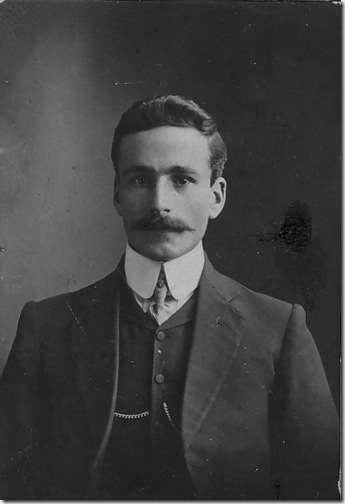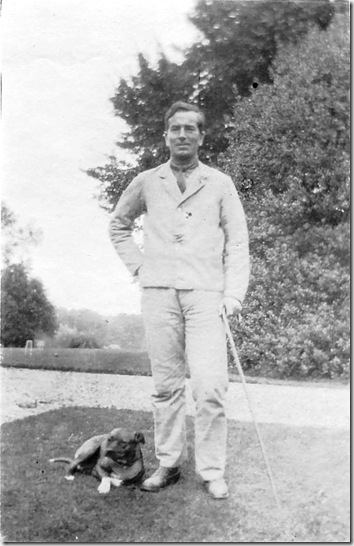The Second Battle of Bullecourt began early on the morning of Thursday 3 May 1917[1]. The offensive had originally been intended to support a failed attack to the south.. The French attacked on 15 April 1917 but failed. However, both British and French leaders agreed to continue operations, one of which was a combined British and Australian attack on the Hindenburg Line around Bullecourt where the previous attempt to capture and hold sections of the German line had failed so disastrously on 11 April 1917. The objective was to capture the railway embankment at Reincourt, thus damaging German transport while opening an immediate front beyond German fortifications.
The battle was a confused one. Two hours after it started, the centre of the 2nd Australian Division had reached its second objective, but with troops barely able to hold it, let alone to push onto Reincourt at the scheduled time of 6am. Around 7am Colonel Murray and some of his men from the Australian 18th were pinned down in shell-holes facing O.G. 1, the first of the defensive lines. CEW Bean, the official Australian  War historian, described the following events in this way:
War historian, described the following events in this way:
A little later, Lieutenant M. C. Drummond (Petersham and Leichardt) N.S.W), the intelligence officer of the 18th Battalion, succeeded in reaching from the rear the shell-holes in which Colonel Murphy and a number of men were lying in front of O.G.1. On learning of the situation Murphy decided to attempt the rushing of the trench. On rising to make the charge, however, the gallant Drummond, a sergeant, and two men were instantly killed. Seeing others also fall, Murphy gave the order to dig in and hold on.[2]
This view of Morris (photo) was shared by others. On 6 May 1917, three days after Morris’s death, a fellow officer (Lt. Jim Harrison) wrote to brother Will: “Maurice was ... the most fearless officer in the Battalion, he was exceeding his duty at the time, very typical of him.”
The story that ended here began in 1914. On 4 August, Britain declared war on Germany. The Australian Prime Minister declared Australia’s support the following day, offering an expeditionary force of 20,000 men to serve in any destination as required by the Home Government. On 6 August, London cabled its acceptance.
There was a rush of patriotic support for the war. On 25 August 1914, Will, the oldest of the Drummond boys, enlisted[3]. It had been an agonizing decision. His Christian beliefs would not allow him to take life, but he also felt that he must do his duty. His solution was to join as a stretcher bearer: 'I have tried to play the game and to live up to the ideas Jesus has set before me', he wrote to Morris on the day of the Gallipoli landing (25 April 1915).
 Morris and David Drummond did not enlist immediately. The three brothers had agreed that David, as the only married one, should stay to be in a position to look after their sister Ellie should that prove necessary. Later, when David did try to enlist, he would be rejected twice, probably on the grounds of his deafness. He couldn’t have heard orders in the battlefield din.
Morris and David Drummond did not enlist immediately. The three brothers had agreed that David, as the only married one, should stay to be in a position to look after their sister Ellie should that prove necessary. Later, when David did try to enlist, he would be rejected twice, probably on the grounds of his deafness. He couldn’t have heard orders in the battlefield din.
For Morris's part, he followed events closely, finally deciding in August 1915 that he too must enlist. “Perhaps you will not be altogether surprised”, he wrote to David in August 1915, but I have felt it coming on - like a bad cold... while I have the conviction that men are really required I cannot hang back and let someone else carry my bundle... I've taken the step and hope it won't be labour in vain, but at any rate I've no delusions about the fun and glory of it.”
Morris was offered an immediate commission, but declined it.. His sister recalled later that officer training would have delayed his passage, and he also wanted first to know something about the men he would command[4].
I wondered about this, for family stories are always uncertain things and especially long after the event. However, the official Australian War Memorial form required for inclusion in the Roll of Honour includes this reference: “Refused to accept any promotion in camp & again in France until he had served in a battle.”[5] The information was supplied much earlier by Brother William, but is consistent with his sister’s recollection.
Based on this and other records, Morris was clearly a remarkable man.
The death came as a huge blow. The three brothers had always been very close, with Morris and Will forming a close knit team providing support to both David and Bid (the brothers' pet name for sister Ellie). Throughout the war Morris had written regularly to David; cheery letters full of details, such as descriptions of French farming methods, intended to interest the younger brother. However, they also gave a clear picture of the hardships and dangers associated with the war.
Brother William survived the war. He was repatriated home and had to spend some time in convalescence. The photo shows him during that period. For his part, Morris’ memory as a remarkable man was carried down through the generations to this day.
[1] C.E.W. Bean, 'The Australian Imperial Force In France 1917', Volume IV, The Official History of Australia in the War of 1914-1918, Angus and Robertson, Sydney, 1933 p412f
[2] Op cit, Note 88, p456
[3] The Australian Army's Central Records Office (CARO) provided original enlistments details for Will and Morris Drummond. (CARO to author, 5 February 1982.)
[4] Interview with Mrs Morris, 1 October 1982
[5] Australian War Memorial Records, http://www.awm.gov.au/collection/records/awm131/awm131-15-0676.pdf, accessed online 3 May 2017.









4 comments:
I was glad to find more about Morris Drummond after the recent mention of him on the ANZAC Day. To get to know stories of the Drummond family is inspiring. The family seems to be governed by strong values of family, mutual support, courage, sense of duty and contribution. I am glad that we do not have to be tested now in such tragic circumstances as wars, at least not in Australia. At the same time at such times it becomes very clear from what material some special men are made of. Morris Drummond, as shown by Jim Belshaw, was made of the best stuff.
A
Thank you, A. I appreciate your comment. I do so wish that I could have known Morris. I knew the others. Just thinking on that, Will was a very gentle man. I have some photos of him that I should put up at some point.
Hi Jim
Could you please make the following a little more clear:
Lieutenant M. C. Drummond (Petersham and Leichardt) N.S.W), the intelligence officer of the 18th Battalion, succeed from the rear the shell-holes in which Colonel Murphy and a number of men were lying in front of O.G.1.
With respect
kvd
Thanks, kvd. Transcription error. Correction made!
Post a Comment